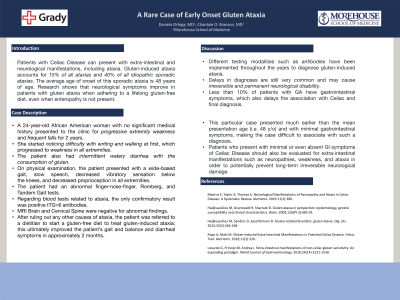Monday Poster Session
Category: Small Intestine
P2657 - A Rare Case of Early Onset Gluten Ataxia
Monday, October 23, 2023
10:30 AM - 4:15 PM PT
Location: Exhibit Hall

Has Audio
- DO
Daniela Ortega, MD
Morehouse School of Medicine
Atlanta, Georgia
Presenting Author(s)
Daniela Ortega, MD, Chantale O. Branson, MD
Morehouse School of Medicine, Atlanta, GA
Introduction: Patients with Celiac Disease can present with extra-intestinal and neurological manifestations, including ataxia. Gluten-induced ataxia accounts for 15% of all ataxias and 40% of all idiopathic sporadic ataxias. The average age of onset of this sporadic ataxia is 48 years of age. Research shows that neurological symptoms improve in patients with gluten ataxia when adhering to a lifelong gluten-free diet, even when enteropathy is not present.
Case Description/Methods: A 24-year-old African American woman with no significant medical history presented to clinic for progressive extremity weakness, and frequent falls for 2 years. She started noticing difficulty with writing and walking at first, which progressed to weakness in all extremities. She denied any numbness or tingling in her extremities and no vision or speech difficulties. In addition to this constellation of symptoms, the patient referred to experiencing intermittent watery diarrhea with consumption of gluten.
On physical examination, the patient presented with a wise-based gait, slow speech, decreased vibratory sensation below the knees, and decreased proprioception in all extremities. The patient had an abnormal finger-nose-finger test, Romberg test, and Tandem Gait test. Regarding blood tests related to ataxia, the only confirmatory result was positive tTG-6 antibodies. MRI Brain and Cervical Spine were negative for abnormal findings. After ruling out any other causes of ataxia, the patient was referred to a dietitian to start a gluten-free diet in order to treat gluten-induced ataxia; this ultimately improved the patient’s gait and balance and diarrheal symptoms in approximately 2 months.
Discussion: Different testing modalities such as antibodies have been implemented throughout the years to diagnose gluten-induced ataxia. However, delays in diagnoses are still very common, and may cause irreversible and permanent neurological disability. Less than 10% of patients with GA have gastrointestinal symptoms, which also delays the association with Celiac and final diagnosis.
This particular case presented much earlier than the mean presentation age (i.e. 48 y/o) and with minimal gastrointestinal symptoms, making the case difficult to associate with such a diagnosis. For this reason, patients who present with minimal or even absent GI symptoms of Celiac disease should also be evaluated for extra-intestinal manifestations such as neuropathies, weakness, and ataxia in order to potentially prevent long-term irreversible neurological damage.
Disclosures:
Daniela Ortega, MD, Chantale O. Branson, MD. P2657 - A Rare Case of Early Onset Gluten Ataxia, ACG 2023 Annual Scientific Meeting Abstracts. Vancouver, BC, Canada: American College of Gastroenterology.
Morehouse School of Medicine, Atlanta, GA
Introduction: Patients with Celiac Disease can present with extra-intestinal and neurological manifestations, including ataxia. Gluten-induced ataxia accounts for 15% of all ataxias and 40% of all idiopathic sporadic ataxias. The average age of onset of this sporadic ataxia is 48 years of age. Research shows that neurological symptoms improve in patients with gluten ataxia when adhering to a lifelong gluten-free diet, even when enteropathy is not present.
Case Description/Methods: A 24-year-old African American woman with no significant medical history presented to clinic for progressive extremity weakness, and frequent falls for 2 years. She started noticing difficulty with writing and walking at first, which progressed to weakness in all extremities. She denied any numbness or tingling in her extremities and no vision or speech difficulties. In addition to this constellation of symptoms, the patient referred to experiencing intermittent watery diarrhea with consumption of gluten.
On physical examination, the patient presented with a wise-based gait, slow speech, decreased vibratory sensation below the knees, and decreased proprioception in all extremities. The patient had an abnormal finger-nose-finger test, Romberg test, and Tandem Gait test. Regarding blood tests related to ataxia, the only confirmatory result was positive tTG-6 antibodies. MRI Brain and Cervical Spine were negative for abnormal findings. After ruling out any other causes of ataxia, the patient was referred to a dietitian to start a gluten-free diet in order to treat gluten-induced ataxia; this ultimately improved the patient’s gait and balance and diarrheal symptoms in approximately 2 months.
Discussion: Different testing modalities such as antibodies have been implemented throughout the years to diagnose gluten-induced ataxia. However, delays in diagnoses are still very common, and may cause irreversible and permanent neurological disability. Less than 10% of patients with GA have gastrointestinal symptoms, which also delays the association with Celiac and final diagnosis.
This particular case presented much earlier than the mean presentation age (i.e. 48 y/o) and with minimal gastrointestinal symptoms, making the case difficult to associate with such a diagnosis. For this reason, patients who present with minimal or even absent GI symptoms of Celiac disease should also be evaluated for extra-intestinal manifestations such as neuropathies, weakness, and ataxia in order to potentially prevent long-term irreversible neurological damage.
Disclosures:
Daniela Ortega indicated no relevant financial relationships.
Chantale Branson indicated no relevant financial relationships.
Daniela Ortega, MD, Chantale O. Branson, MD. P2657 - A Rare Case of Early Onset Gluten Ataxia, ACG 2023 Annual Scientific Meeting Abstracts. Vancouver, BC, Canada: American College of Gastroenterology.
